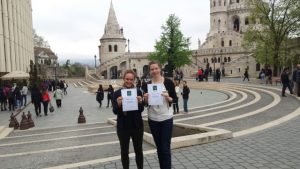11 Apr Young investigator awards for Rosan van Zoest and Mikaela Smit
At the end of the 20th International Workshop on HIV Observational Databases in Budapest (7 – 9 April) Rosan van Zoest received one of the two young investigator awards for best poster presentation for her work on “Primary and secondary cardiovascular prevention is suboptimal in both HIV-infected and uninfected participants of the AGEhIV Cohort Study” (with: Marc van der Valk, Ferdinand Wit, Katherine Kooij, Maria Prins, Peter Reiss, on behalf of the AGEh¬IV Cohort Study Group).
This study aimed to identify common modifiable cardiovascular risk factors and investigated the use of preventative cardiovascular medicines and attainment of targets as per Dutch cardiovascular risk management guidelines. HIV-positive individuals participating in the AGEhIV cohort study had a higher predicted cardiovascular risk than comparable HIV-negative controls. Dyslipidemia (an abnormal amount of lipids in the blood), physical inactivity, hypertension and smoking were the most prevalent cardiovascular risk factors both in HIV-positive and HIV-negative participants. Furthermore, our results showed that the management of blood pressure, lipids and use of cardiovascular preventative medication was suboptimal and can be improved in both HIV-positive and HIV-negative individuals.
Mikaela Smit (postdoc at Imperial College London) received the second young investigator award for best oral presentation for her work on “Reduction in future burden of cardiovascular disease is larger by interventions targeting traditional cardiovascular risk factors compared to HIV-specific interventions: a modelling study” (with: Rosan van Zoest, Ferdinand Wit, Ilonca Vaartjes, Colette Smit, Marc van der Valk, Ard van Sighem, Peter Reiss).
This modelling study aimed to assess the impact of traditional and HIV-specific cardiovascular interventions in the HIV-positive population in care in the Netherlands. The model predicted an increase in incidence of cardiovascular disease over the next decades and showed that cardiovascular intervention strategies will be able to reduce the otherwise rising number of serious cardiovascular events, with traditional cardiovascular interventions having a greater impact compared to HIV-specific interventions.

Our congratulations to these two young investigators!
(Mikaela on the left, Rosan on the right)
